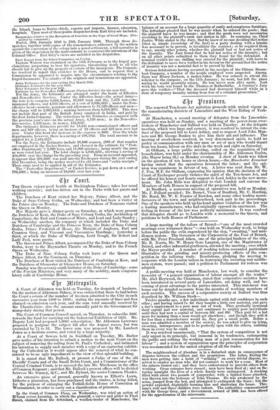'!it 31fatrufn1is.
A Court of Aldermen was held on Tuesday, for despatch of business. On the motion of Alderman Sidney, it was ordered that there be laid before the Court a return of the number of freemen admitted to the City in each successive year from 1800 to 1850; stating the amounts of fines and fees charged on admission each year, and the sum total annually received by the Chamberlain; also the amount annually paid to the Government for stamp-duty during that period.
The Court of Common Council agreed, on Thursday, to subscribe 500/. towards the fund for carrying out the Industrial Exhibition of 1851. Mr. Deputy Lott had proposed 1,0001. subscription: Mr. Alderman Lawrence proposed to postpone the subject till after the August recess, but was overruled by 71 to 32. The lower sum was proposed by Mr. Lambert Jones as a medium course, and voted by a large majority.
At a Court of Sewers held in Guildhall on Tuesday, Mr. Barber gave notice of his intention to submit a motion to the next Court on the subject of removing the railing from St. Paul's Cathedral; and intimated his intention to supply each member with a copy of an engraving exhibit- ing the Cathedral as it would appear after the removal of what he con- sidered to be an ugly impediment to the view of that splendid building.
It is stated that Mr. Bullock, at present a Judge of one of the old Sheriffs' Courts and of the Small Debts Court, and a Commissioner of the Central Criminal Court, is to succeed the late Mr. Mirehouse in the office of Common Sergeant ; and that Mr. Bullock's present offices will be divided between Mr. Gurney, Q.C., and Mr. Ryland, the senior Common Pleader.
An extensive piece of ground, generally known as Elliott's Lawn, hitherto a plantation, has been purchased and the timber, is being felled, for the purpose of enlarging the Tothill-fields House of Correction at Westminster, in order to carry out a classification of prisoners.
In the Court of Common Pleas, on Wednesday, was tried an action of 1VLean rem. Leemin• g, in which the plaintiff, a carver and gilder in Fleet Street, claimed from the defendant, a woollen-trader of Manchester, the balance of an account for a large quantity of costly and sumptuous furniture. The defendant pleaded that he was insane when he ordered the goods ; that the plaintiff knew he was insane ; and that the good, were not necessaries according to the plaintiff's rank and station in life. In summing up, Chief Justice Wilde stated to the Jury, that he knew of no ease deciding that notice [that is, simple knowledge of the fact] to a party dealing with a lunatin was necessary to be proved, to invalidate the contract; so he required them. to say, among other points, whether the plaintiff had or had not notice of the insanity. The Jury found that he had not notice of the insanity; but; on all other points submitted to them they found for the defendant. A nominal verdict for one shilling was entered for the plaintiff; with leave to the defendant to move for a verdict in his favoueon the ground that the notice of insanity was not a material fact to be proved by him.
Serious defalcations having occurred in the receipts of the Citizen Steam- boat Company, a number of the people employed were suspected. Among them was Henry Jackson, a money-taker. He was ordered to attend the solicitor to the company, on the 11th January; he went, but left the place.. saying he would presently return. He was never seen alive again. Last week his body was found in the Thames at Rotherhithe. A Coroner's jury gave this verdict—" That the deceased had destroyed himself while 111 a state of temporary insanity arising from fear of a criminal prosecution."
























 Previous page
Previous page